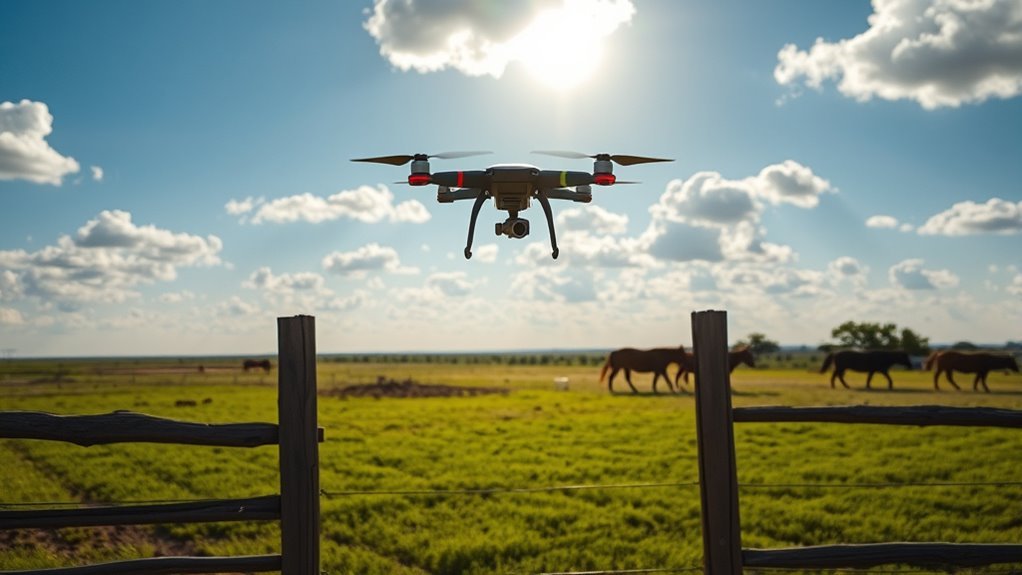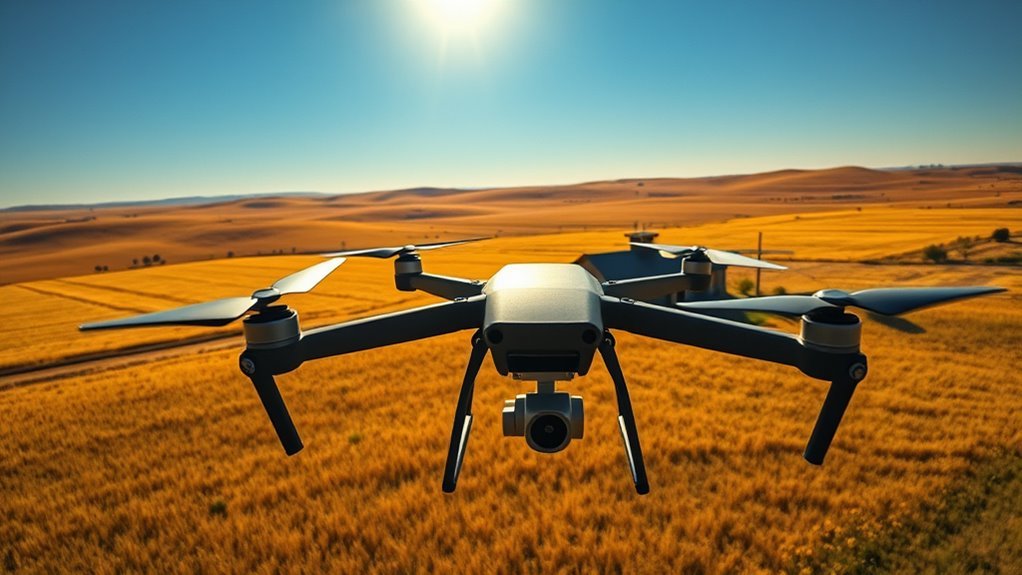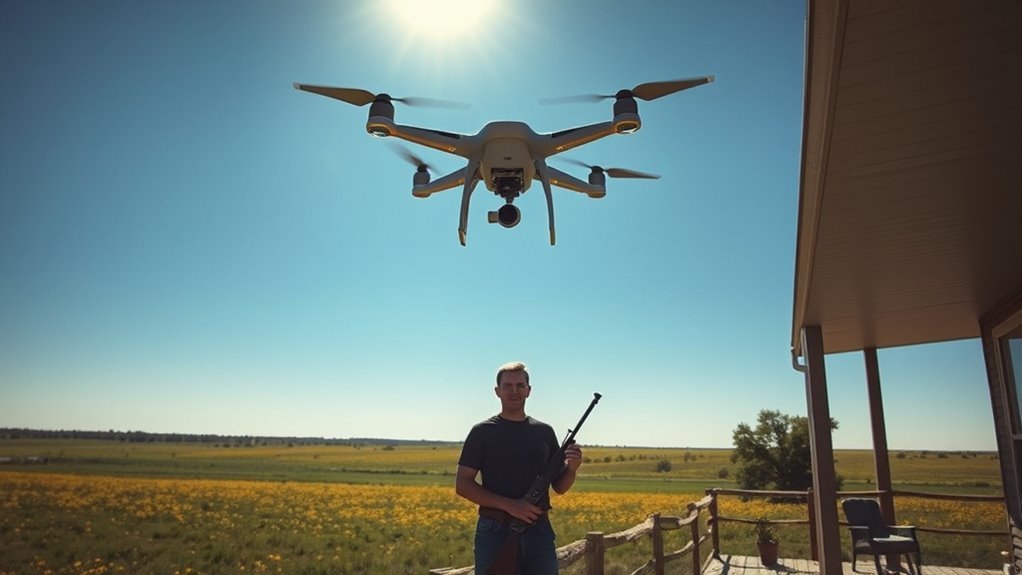You can’t just shoot drones over your Texas property without facing serious legal trouble. Doing so might lead to criminal charges and civil liability for damages. Property rights vary, but airspace is generally public, and shooting at a drone could be seen as reckless. Using alternatives, like talking to the operator or contacting local authorities, is often a better choice. Exploring the specific laws around drones and airspace can help you navigate your rights effectively.
Understanding Drone Laws in Texas

When considering whether you can shoot drones over your Texas property, it’s vital to understand the state’s drone laws. Texas has specific drone regulations that govern where and how drones can operate. Generally, flight restrictions are in place to protect privacy and safety, which means you can’t just shoot down a drone without facing potential legal consequences. The Federal Aviation Administration (FAA) also imposes regulations that may affect your rights regarding drones in the airspace above your property. It’s important to familiarize yourself with both state and federal laws to avoid legal repercussions. In Texas, asserting your freedoms while respecting these regulations guarantees you navigate the complexities of drone laws effectively. Always stay informed and aware of the current legal landscape.
Property Rights and Airspace

Understanding property rights in relation to airspace is key when discussing the legality of shooting drones over your Texas property. Many property owners believe they own the airspace above their land, but the reality is more nuanced. Airspace ownership generally extends only to a reasonable height, while the airspace itself is regulated federally. Here’s a breakdown of relevant concepts:
| Concept | Description | Legal Implications |
|---|---|---|
| Property Boundaries | Defined limits of your land ownership | Does not necessarily include airspace |
| Airspace Ownership | Rights extend to a reasonable height | Federal regulations apply |
| Drone Regulations | Governed by FAA laws | Local laws may also impact usage |
| Trespass | Drones flying below a certain height may infringe rights | Varies by case |
| Liability | Potential responsibility for shooting drones | Depends on circumstances |
Knowing these principles helps clarify your rights.
Legal Consequences of Shooting Drones

While the temptation to shoot down a drone hovering over your property may seem justified, the legal consequences can be severe. Understanding the legal implications is essential before taking drastic action. Here are some key considerations:
- Criminal Charges: You could face charges for discharging a firearm in a prohibited area.
- Civil Liability: Damaging property can lead to lawsuits from the drone owner.
- Self Defense Considerations: Claiming self-defense may not hold up if the drone poses no immediate threat.
- Local Ordinances: Different areas have specific laws regarding firearms and drones.
- Potential Fines: Violating drone regulations could result in hefty fines.
Ultimately, understanding these factors can help you navigate the complex landscape of drone-related legalities effectively.
Alternatives to Taking Drastic Action
Instead of resorting to drastic measures like shooting down a drone, you might consider several alternative approaches that can effectively address your concerns. First, explore drone deterrents, such as signal jammers or reflective materials that can dissuade operators from hovering over your property. Engaging in dialogue with the drone operator can lead to a peaceful resolution, fostering understanding and respect for your privacy. Additionally, contacting local authorities or neighborhood associations may help raise awareness about drone usage in your area. Utilizing technology to monitor drone activity can also empower you to take informed steps without escalating conflicts. Ultimately, these alternatives not only protect your rights but also promote a more harmonious coexistence in your community.
Recent Cases and Legal Precedents
Recent legal cases concerning drone usage over private property have begun to clarify the boundaries of property rights and airspace regulations. As drone regulation updates continue to evolve, it’s essential for you to understand how recent rulings affect property owner rights. Here are some key takeaways:
- Courts are increasingly recognizing the importance of privacy.
- Airspace is generally considered public, but property boundaries do matter.
- State laws vary greatly, influencing your rights.
- Trespassing laws are being applied to drone usage.
- Legal precedents are being set that may impact future regulations.
Understanding these aspects can help you navigate your rights when dealing with drones over your property. Being informed allows you to assert your rights while respecting the evolving landscape of drone regulations.
Frequently Asked Questions
Can I Use a Drone to Monitor My Property?
Over 1.5 million drones are registered in the U.S., enabling effective drone surveillance to monitor your property. Just guarantee you respect property boundaries and local regulations to avoid potential legal issues while using them.
What Are the Penalties for Illegal Drone Shooting in Texas?
In Texas, violating drone regulations could lead to fines or criminal charges. Understanding property rights is vital; shooting a drone may infringe on laws protecting airspace. Always consider legal implications before taking any action.
How High Can Drones Legally Fly Over Private Property?
Drones can legally fly at altitudes up to 400 feet over private property, influenced by drone flight regulations. However, balancing these regulations with your property rights is essential to understanding your legal standing in Texas.
Are There Any State Laws Specifically About Shooting Drones?
State laws regarding drone regulations vary, but generally, you can’t shoot drones due to safety concerns and property rights. It’s essential to understand local laws before considering any action against drones over your property.
Can I Report a Drone Flying Over My Property?
Yes, you can report a drone flying over your property, especially if it’s invading your privacy or causing noise complaints. Document the incidents, and consult local laws to understand your rights regarding drone activity.

